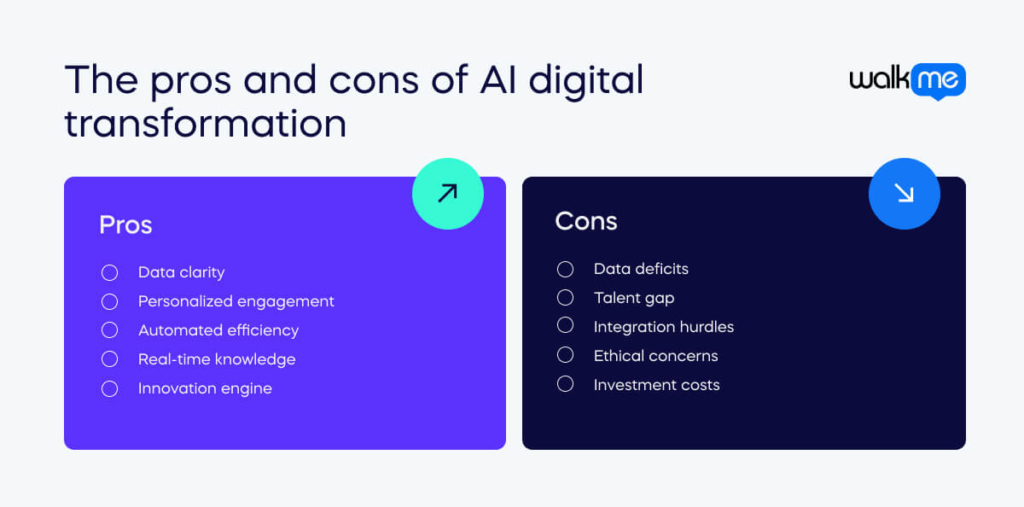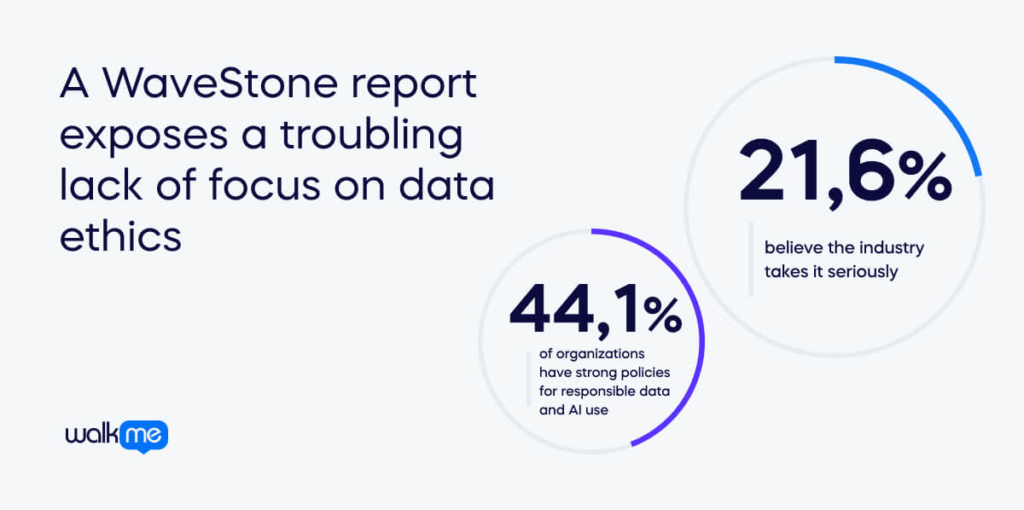Businesses are in a race to match the speed of digital innovations in technology we see today. Tech developments like artificial intelligence (AI) and cloud computing are pushing the boundaries beyond what we once thought possible. Stat
This has led to an overwhelming embrace of these technologies to improve every business level. This is what we call digital transformation (DX). Global business sentiment is shifting towards DX to fundamentally change how things are done.
This has sparked reconfigurations in business models, with processes being reimagined. It’s resulted in cultural shifts and the integration of AI-driven workflows due to increased tech adoption.
AI developments continue to draw feverish interest for its potential to transform our relationship with technology.
In this article, we’ll investigate the role of AI in digital transformation and its implications for the future of business. We’ll also explore AI-focused digital transformation examples and their benefits and challenges.
What is artificial intelligence (AI) in digital transformation?
AI DX goes beyond simply adopting new technologies. It’s about leveraging AI’s capabilities across business functions to fast-track specific goals.
For a brief overview, artificial intelligence (AI) is the field of using data to train computers to mimic actions in the same way a human would. These systems rely on machine learning (ML) algorithms and natural language processing (NLP) to learn, problem-solve, recognize patterns, and complete complex tasks.
McKinsey’s latest research suggests generative AI could significantly boost the global economy. Their estimate predicts an annual impact between $2.6 trillion and $4.4 trillion.
To better understand how AI aligns with DX efforts, let’s explore key AI techniques used to unlock new capabilities:
- Machine learning (ML) algorithms analyze vast amounts of data to identify patterns and trends. Businesses can leverage these insights to enhance processes, make accurate forecasts, and data-backed decisions that support DX goals.
- Deep learning (DL) is a subset of ML. It excels at tasks like image recognition and NLP. In digital transformation, DL can be used to analyze customer reviews, identify anomalies in equipment data, or personalize marketing campaigns.
- Natural language processing (NLP) allows machines to understand human language. DX can use this to create chatbots for customer service, analyze social media sentiment, or automate document processing.
What is the impact of AI on digital transformation?
AI has long been an anticipated field of interest for computer scientists worldwide. Since Alan Turing pioneered the field in the early 20th century, AI continues to uncover new avenues for transformation.
Let’s explore some key areas where AI is reshaping the digital transformation arena:
AI for enhancing customer experiences (CX)
Today, artificial intelligence (AI) is being used to create intelligent chatbots capable of handling customer inquiries around the clock. These chatbots leverage generative AI technology, enabling them to deliver highly accurate and rapid responses.
The wide applicability of AI chatbots across various industries has cemented their position as one of the leading use cases for AI today. From banking to healthcare, AI-powered chatbots are augmenting customer-facing functions, ultimately delivering a superior customer experience.
AI for data analytics
Elsewhere, manual data analysis, with its inherent limitations, is also being revolutionized by AI-powered tools. AI can scan vast datasets, identifying subtle patterns and trends invisible to the human eye.
Repetitive tasks, often bottlenecks in operational efficiency, are finding their match in AI. Intelligent process automation leverages AI to automate these tasks, reducing human intervention and allowing employees to shift their focus towards more meaningful initiatives.
AI coding assistants
Elsewhere, the software development landscape can benefit significantly from AI coding assistants. These AI-powered tools act as virtual collaborators for developers, offering functionalities like suggesting code corrections, identifying potential bugs, and even generating code snippets.
This not only speeds up development timelines but also ensures code quality remains high – a win-win for developers and businesses alike.
Proactive maintenance
Predictive maintenance, a cornerstone of proactive asset management, is witnessing a transformation through AI.
Traditionally, maintenance schedules were reactive, leading to unexpected equipment failures and associated downtime. AI algorithms can identify subtle deviations from normal operating parameters by analyzing sensor data from equipment in real-time.
These deviations may signal a potential future failure. Armed with this advanced warning, businesses can schedule targeted maintenance interventions before breakdowns occur.
AI essentially transforms maintenance from a reactive cost center to a proactive driver of operational excellence. When done right, the benefits include minimized downtime, reduced repair costs, and a more efficient overall operation.
Real-world use cases of AI-focused digital transformation
Discussions about AI’s potential impact on digital transformation (DX) are plentiful. But let’s move beyond theoretical possibilities and explore concrete examples.
Here, we’ll see how businesses actively use AI to reshape their operations today.
- JPMorgan Chase has a legacy of AI
JPMorgan Chase has been at the forefront of leveraging predictive AI and machine learning for decades. These AI algorithms analyze massive datasets of transaction data. They impact areas like marketing, fraud detection, and risk reduction.
Their algorithms monitor patterns that might point to suspicious activity. This allows them to flag potential fraud attempts in real-time. These solutions work together to minimize financial losses and protect customer accounts.
In his letter to shareholders, J.P. Morgan Chase CEO Jamie Dimon states: “Over time, we anticipate that our use of AI has the potential to augment virtually every job, as well as impact our workforce composition. It may reduce certain job categories or roles, but it may create others as well.”
- CVS teams up with Microsoft
CVS is stepping up its game when it comes to using technology to improve healthcare. In December 2021, they teamed up with tech leader Microsoft. They provided expert solutions in artificial intelligence (AI) and cloud computing.
Microsoft’s AI solutions will help CVS “accelerate a data-driven, personalized customer experience.” AI will streamline tasks like prescription processing, allowing CVS staff to focus on patient interaction.
Microsoft’s cloud will power advanced machine learning models. This will let CVS build loyalty programs and deliver targeted health advice. The company will also have access to Microsoft HoloLens, Dynamics 365 Guides, and Remote Assist.
This will provide CVS Health employees with hands-on, mixed-reality support. These tools offer step-by-step visual guidance and real-time expert assistance. This presents a chance to reimagine staff training and how CVS supports patients.
- Nike’s major AI acquisitions
Who hasn’t heard of Nike? This globally recognized name in athletic apparel continues to make moves that strengthen its digital reach. For example, let’s look at its acquisition of companies Zodiac Inc., Invertex Ltd, and Celect.
Nike bought Zodiac Inc. in 2018, a company that specializes in consumer data analytics. The company uses Zodiac’s AI to analyze customer data and identify patterns. This helps it tailor promotions and loyalty programs to customer needs.
Invertex Ltd’s computer vision technology powers the Nike Fit app. The app accurately scans customers’ feet for precise shoe size recommendations. Invertex’s AI solutions enabled Nike to enhance the shopping experience and drive sales.
“Nike’s connection to and understanding of their consumer is unsurpassed, and we look forward to joining their team to help drive the Consumer Direct Offense,” said Invertex CEO David Bleicher.
In 2019, Nike acquired Celect, an AI-powered inventory optimization firm. Here, AI helps with supply chain management. Nike can then ensure the right products reach stores on time, creating happy customers and reducing waste.

What are the benefits of AI digital transformation?
Here are five key ways AI digital transformation is supercharging businesses:
Data clarity
Businesses generate massive data, but extracting insights can be a challenge. AI excels at analyzing vast datasets and uncovering hidden patterns. This empowers data-driven decisions, process optimization, and improved predictions.
Personalized engagement
Customer experience is king in today’s competitive landscape. AI personalizes customer interactions with unprecedented detail. Imagine online shopping tailored to your preferences, with product recommendations based on past purchases and browsing behavior. AI personalizes marketing, product suggestions, and even customer service, fostering deeper engagement and loyalty.
Automated efficiency
Repetitive tasks drain employee productivity. AI-powered automation can take over these tasks, letting employees create value elsewhere. This boosts productivity and improves employee satisfaction.
Real-time knowledge
AI can scan data in real-time, offering 24/7 insights that inform business decisions and sharpen operations. Businesses can use this data to spot trends, forecast customer needs, and make adjustments as necessary.
Innovation engine
AI’s relationship with data paves the way for groundbreaking discoveries. From robots working alongside humans in factories to medical applications that improve diagnosis and treatment, industry innovations are being made possible through AI.
What are the challenges of AI digital transformation?
While the road to digital proficiency is paved with good intentions, AI for digital transformation has its own set of challenges.
McKinsey famously reported, “When organizations undertake a transformation to improve performance, research shows those efforts fail 70 percent of the time.”
Here are five key roadblocks businesses might encounter on their AI transformation journey:
Data deficits
AI thrives on data, but many businesses lack the quality needed for effective training. Without clean data, AI algorithms may generate inaccurate or misleading insights.
Talent gap
Implementing and managing AI requires skilled professionals. Businesses might struggle to find or develop the necessary data science, machine learning, and AI engineering expertise.
Integration hurdles
Integrating AI seamlessly into existing systems and workflows can be complex. Businesses must consider infrastructure upgrades, data security protocols, and change management strategies.
Ethical concerns
AI algorithms can perpetuate biases present in the data they’re trained on. Businesses must ensure their AI systems are fair, unbiased, and transparent.
Investment costs
Implementing AI can be expensive, from acquiring the necessary technology to hiring skilled personnel. Businesses must carefully assess the costs and benefits before embarking on their AI DX journey.
The future of AI in DX
The potential of AI is no longer restricted to the pages of far-flung sci-fi novels. Decades of iteration and improvement have finally seen it enter the mainstream.
Today, the availability of AI-powered tools like ChatGPT is transforming our access to information. AI-image generators like Midjourney can generate realistic art in seconds. These technologies are sending ripples industry-wide – and not always for the better.
While the application of AI proves exciting, it poses material risks when not implemented responsibly. AI risks include bias, discrimination, data privacy violations, and the potential for social manipulation.
If businesses are to leverage AI’s full capabilities, they must do so responsibly and incrementally. Digital leaders must upskill the workforce to use, manage, and interpret AI models ethically.
This also involves emphasizing the importance of governance and compliance throughout the process.

A WaveStone report exposes a troubling lack of focus on data ethics. Less than half of organizations (44.1%) have strong policies for responsible data and AI use. Even more concerning, only 21.6% of respondents believe the industry takes this issue seriously enough. Digital transformation extends beyond isolated tech investments. It requires aligning said investments with overarching goals to create sustainable value.


